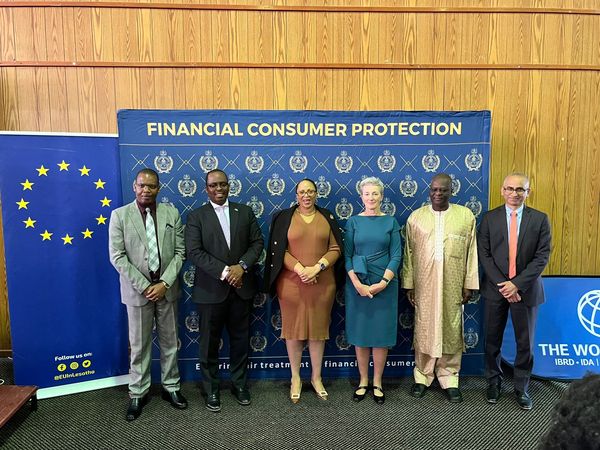Lesotho’s financial infrastructure is well poised for development, and a new partnership announced today between the Bank of Lesotho, the Ministry of Finance and Development Planning, the European Union and the World Bank will harness this potential, boost inclusive growth and expand access to financial services.
Lesotho’s financial infrastructure is well poised for development, and a new partnership announced today between the Bank of Lesotho, the Ministry of Finance and Development Planning, the European Union and the World Bank will harness this potential, boost inclusive growth and expand access to financial services.
The partnership, which will see the European Union invest approximately LSK 6 million (US$322,623) in total, will leverage the World Bank’s expertise to provide technical assistance to the Bank of Lesotho in three areas: a) development of a Financial Sector Development Strategy (FSDS) II; b) development of a roadmap to increase merchant acceptance of electronic payments; and c) just-in-time technical assistance to strengthen credit infrastructure. The FSDS II will develop a 2030 vision for the stability, inclusiveness, and resilience of Lesotho’s financial sector and identify key policy reforms to be implemented over a five-year period to realise this vision. It will draw on relevant diagnostics, including those conducted by the World Bank and IMF through their Financial Sector Assessment Program in 2022, and build on other relevant strategies such as the National Financial Inclusion Strategy and National Financial Education.
Strategies currently under development.
The technical assistance that the Central Bank of Lesotho will benefit from is part of the Rapid Response Window for Investment and Business Climate Facility, a demand-driven facility funded by the European Union and implemented by the World Bank for the Sub-Saharan Africa Region. The facility aims to support partner countries in Sub-Saharan Africa, including Lesotho, to unlock private investment with a special focus on job creation for youth and women. To date, the European Union, together with the World Bank, has supported 13 countries in Sub-Saharan Africa to develop more resilient and effective financial services.
The partnership’s support also complements the ongoing support provided under the World Bank-funded Competitiveness and Financial Inclusion Project (CAFI), as well as technical assistance activities provided by the World Bank with funding from the G2Px Facility and the WeFi Program. “We are pleased to embark on this partnership, which marks an important commitment towards the development of Lesotho’s financial sector.
“The EU and the Bank of Lesotho are strengthening their collaboration to realise our shared vision of promoting inclusive economic growth and stability. We appreciate the EU’s support and the Bank of Lesotho’s expertise, which will contribute to the development of the five-year Financial Sector Development Strategy and strengthening the sector,” said World Bank Resident Representative Yoichiro Ishihara.
Technical assistance is just one of the tools the European Union has available to support the Bank of Lesotho and the Ministry of Finance and Development Planning. The EU currently has a technical assistant at the ministry to support public financial management reforms, and can mobilize other tools if requested, such as helping financial institutions build their cybersecurity capacity.
“But beyond the technical aspects, the partnership between the Bank of Lesotho, the Ministry of Finance and Development Planning, the European Union and the World Bank signifies a deeper commitment to development and progress. It reflects a shared vision of a future where all individuals have access to financial services, where economic stability paves the way for growth and prosperity, and where institutions are able to respond to the evolving needs of our societies,” it said.
Opening remarks by Her Excellency Paola Amadei, Ambassador of the European Union to Lesotho.
The Government of the Kingdom of Lesotho hailed the tripartite partnership as the most effective and efficient way towards the same goal, saying: “What hampers development is duplication of efforts and working separately. There is no way to advance development in silos. So working together is the right move forward and it is critical,” said Minister of Finance and Development Planning, Dr Letsilisitsoe.
Matrangyane.
The Bank of Lesotho also thanked the EU and the World Bank for their support and collaboration, saying, “This partnership will play a major role in shaping the future of Lesotho’s financial sector. It comes at an opportune time as the Bank is developing its second Financial Sector Development Strategy, a blueprint for the development of Lesotho’s financial sector that seeks to create a more resilient, efficient and inclusive sector that benefits all members of society.”
“People in the rural economy, especially women and girls, must be economically included. I call on all of us to implement strategic interventions in this sector, not just for us but for future generations,” said Dr Emmanuel Maluke Letete, Governor of the Central Bank of Lesotho.
contact address:
Central Bank of Lesotho: emoremoholo@centralbank.org.ls
For more information about the Central Bank of Lesotho, please visit https://www.centralbank.org.ls/.
European Union Delegation to Lesotho: delegation-lesotho@eeas.europa.eu
For more information on the European Union Delegation’s activities in Lesotho, please visit https://www.eeas.europa.eu/delegations/lesotho_en
World Bank: Cheryl Khuphe, ckhuphe@worldbank.org
For more information about the World Bank’s work in Lesotho, visit https://www.worldbank.org/en/country/lesotho.


